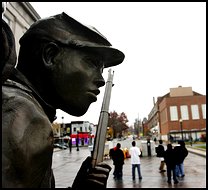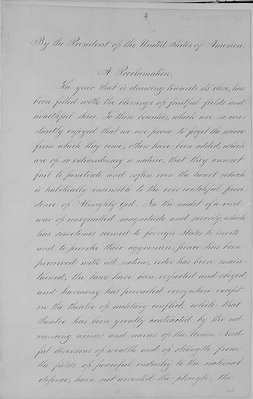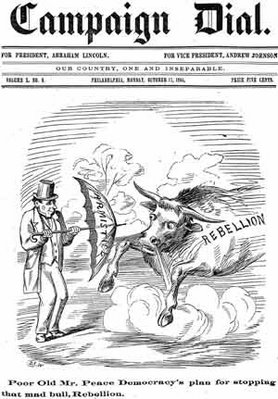 This Norman Rockwell painting "Lincoln the Railsplitter," which shows a young Abraham Lincoln before he became U.S. president, will be shown in public for the first time in years after being bought by a museum for $1.6 million.
This Norman Rockwell painting "Lincoln the Railsplitter," which shows a young Abraham Lincoln before he became U.S. president, will be shown in public for the first time in years after being bought by a museum for $1.6 million.
The Butler Institute of American Art bought the painting Nov. 30 in a sale at Christie's Auction House in New York. The previous owner was Texas billionaire and former presidential candidate H. Ross Perot.
The acquisition was announced Sunday. The painting will be unveiled Feb. 16.LINCOLN THE RAILSPLITTERThe mystery of Abraham Lincoln was in his ability to unite the most opposing fractions of society while maintaining a divisive position. This ability to transcend the opposites made him a subject of claim from diametrically opposed entities and worldviews. Like Hegel in philosophy, Lincoln was equally claimed by schools of thought that would shoot each other at the encounter, and many, in fact, did.
Lincoln became an inspiration for Republicans and Democrats, evangelical conservatives and liberal-progressives alike. Even ever dull communists and ever angry radical socialists scraped a spark of inspiration from the mounting figure of Lincoln. This inspiration in itslef is encouragable, but after every group had shaped its own statue of Lincoln according to its own manual we've lost the real Lincoln. Lincoln turned into a concept and as every concept began to be manipulated to fit ideologies and socio-political insecurities. And as in the case of everything under the sun, the most insecure and the most unrelated ideologies manipulated Lincoln the most and claimed him the strongest.
In reality, there was and there is only one Lincoln. Many politicians have comapred and continue comparing themselves to Lincoln without understanding that what transformed that poor tall Midwestern fellow into Abraham Lincoln was not his external attributes or his immideate surrounding.
Today many 'Lincoln wannabe' polticians believe that being young and charismatic, going from rags to riches, advocating the rights of opressed, or even coming from Springfield, IL is what makes the real Abraham Lincoln.
This is a 'Victoria's Secret' version of Lincoln.
In fact, being shot in the back of a head for uncompromisingly fighting an unpopular war is what makes the real Abrahm Lincoln.
It is really sad that 150 years after the Civil War, the mindset against which Lincoln fought all his life and by which he was eventually murdered, finalized the process of hijacking his legacy.
Through the ongoing “sissification” and castration of society, we ended up with an image of Lincoln as benign pacifist, kind and loving father who united the nation. We were given a half-portrait of a man and were tought to ignore the fact that before unifying the country, he divided it. He did not unify by his goodness alone, but by a 'terrible swift sword'. He united by burning down cities, by sacrificing men in thousands and by destroying an entire civilization.
We are sold the image of Lincoln the lawyer, but before becoming a lawyer he was a rail-splitter, a ferocious wrestler who upon his arrival to a new town would challenge the strongest man around and beat him unconscious in front of an amazed crowd.
Let us not forget the toughness of the man.
He was neither a pacifist in his personal life nor in his politics; he was a fighter, a warrior. It is only on the background of this wild midwestern force that we can outline and appreciate his kindness and goodness. It is also important to remember that it was not only his innate kindness that made him great but also his strong sense of justice.
Justice is a balance of mercy and severity. In this perspective, there is no doubt that Lincoln was a kind and good willing man. When Robert E. Lee surrendered at Appomattox, he claimed that he surrendered to Lincoln’s goodness as much as to Grant’s army. Lincoln’s personal anxieties about the tragic war are legendary and his love for all of his fellow Americans, both, North and South, are beyond dispute. But in order to get a real picture of a man, we have to acknowledge the other side of his personality. The side that was there to kill and bring justice through punishing war. The strength of conviction that would stop in front of nothing, the ability to sacrifice other men’s and ultimately his own life for an ideal.
This is the image that was erased by the scribes and Pharisees of modern American scholarship who turned Lincoln into an anti-war marxist hero in order to suit their frightened worldview.
Through the media they painted an image of Lincoln in watercolors and hang it in their plastic exhibition halls. And as they would glorify this new image they could not even imagine that if they had happened to live in the time of Lincoln (and some did), they would be the first to eternally ban his image from display.
The mindset that glorifies Lincoln today is the one that crucified him yesterday and will deny and accuse him every time he returns.
But somewhere there in the forgotten attic of our national memory hangs another image of Lincoln. It is an image carved with a nail on a rusted iron, an image that can scare one in a fierce battle. It is an image that his friend saw when he compared Lincoln’s look to an Indian chief entering an enemy camp. It is an image that is so deeply engraved into the Southern psyche that
many still cannot forget and forgive it for destruction he brought upon them and their families. In short, it is an image that we have to come in terms with, otherwise we are doomed to see it trough the eyes of those who never really understood the man and never appreciated what the man did.
03/12/07
******
POST SCRIPTUM
ON DANGERS OF HISTORIC MANIPULATIONS
We should preserve the whole image and the whole history regardless of our current views. The revisionist histories are like bad translations; the words are there but the meaning is lost.
The preservation of history is not a partisan issue. It is a moral issue and if thoroughly examined a legal issue. The historic lie is the worst form of lying and carries the most devastating impact on generations to come. Parties and politicians make mistakes. People and nations make mistakes. Facing historic reality and the sins of the past is a great step to redemption and liberation. The denial of history, moreover, its manipulation, disintegrates the psychological sanity of an entire nation. It is a more dangerous process than even those who consciously convey it from the blind spot of their limited political existence can perceive.
History is not a discipline one learns in books. As every human being has his or her biography so does every nation. History is a vibrant memory of the nation. History is a Memory of Our Spirit. Those who rewrite history rewrite memory. Memory is a cornerstone of the psychological balance, whether individual or national. The temple of life is founded on memory. Disintegrating memory is a way to destruction of the temple. The loss of memory is the first step to insanity.
The Civil War was a direct result of this process. The national hysteria erupted because the memory of our nation was confused and finally lapsed. People began to interpret history, to bend it, to manipulate it to their political goals. Lincoln's speech at the Copper Union that gained him the Republican nomination was dedicated to this very issue. In his detailed investigation of the Founding Fathers, Lincoln proved that, although owning slaves themselves, most of the Founding Fathers were in core opposed to the expansion and existence of slavery. This speech had an enormous healing impact because it clarified history for a big segment of a confused nation. It gave the Union men moral clarity and confidence in the cause and tradition of freedom. It proved that they were continuing their fathers' job and that their fathers were not bad as many stated consistently.
The Cooper Union speech came too late to extinguish the fire of National Psychosis. The nation fell into a very dark place and the only way out was the terrible therapy of war. A war that still continues today in different shapes.
Every generation experiences psychosis to some degree.
What is important to remember is that a possibility of a complete nervous breakdown known as Civil War is not as remote as it appears. Up to the first shot of the Civil War people rejected it's probability. The war of one hemisphere of the American psyche against the other was unbelievable and was rejected vehemently. It took almost two years for the people in the Union to accept the fact that they were in war against their fellow Americans. The danger of the fierce conflict must not be neglected. The physical confrontation is just a tip of an iceberg. The eruption of the physical Civil War had been brewing since the beginning of the American Republic. Whether it is a physical confrontation or a civil war of thoughts, the impact is devastating. It is a national schizophrenia in which two sides of psyche designed to work in balance work against each other.
The frequency and intensity of the National Neurosis is proportional to the degree of historic distortion.Every totalitarian regime begins with rewriting history. Whoever controls the past, or the psychic foundation of the nation, controls the future. The only way to control the past is through culture. If the mindset that controls culture is not happy with the memory of the nation, it can rewrite it through books, films, media, any form of communication. Media connects us to our past. If the connection is infiltrated with people who do not feel comfortable with the way history progressed, they can simply reshape it. The examples of this are numerous and results are devastating.
History is a Memory of Our Spirit. It has to be transmitted not controlled. Any force over the memory is a violation of the Spirit that shapes time. Reclaiming history, however harsh and unpleasant it might be for the recaller, is a personal responsibility. Knowing history and fighting for history has a therapeutic significance.
When Hitler was outlining the Holocaust, he was warned that a massive termination of Jews may cause a public outrage. Hitler dismissed the warnings by saying, "Who remembers millions of Armenians murdered in 1915?". The Armenian Genocide, executed by the Turkish government only 25 years prior, was forgotten. The Turkish government had done everything possible to silence history, manipulate it and destroy the evidence. A whole generation of Armenians, scattered all over the world as a result, was and is still traumatized by this historic injustice. The denial of history affects everyone involved. Those who are denied justice and those who deny it are equally in danger. Cutting "the mystic cords of memory", as Lincoln put it, cuts us from our tradition, from our source. And the object cut off its source floats chaotically and falls very often on the barren grounds of forgetfulness. The dynamics of the fall is the same whether it's a distorted legacy of one person or of a whole nation. This fall is experienced by many to some degree, and, perhaps, it was experienced most dramatically by Hamlet, the insane prince of Denmark, who lamented before his untimely death that "the chain of times has been broken."








